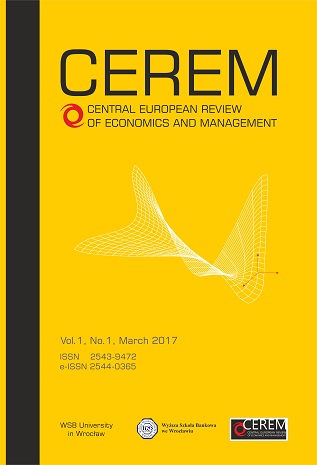The implementation evaluation of the philosophy of continuous improvement in company X –part two
DOI:
https://doi.org/10.29015/cerem.273Słowa kluczowe:
continuous improvement, barriers, benefits, kaizenAbstrakt
Aim: The aim of the study is to analyze the selected areas of the company’s operations. The following aspects were examined: the benefits from the application of the concept of continuous improvement for the company and its individual employees, barriers preventing a successful implementation of the concept and self-evaluation of the company’s employees.
Research method: The company was examined using a survey method. The findings are the result of the academic internship done at this company. The publication is an outcome of a science project within the framework of the Support Program of the Partnership between Higher Education and Science, and Business Activity Sector financed by the City of Wroclaw.
Findings: The paper completes the set of modernization recommendations co-developed by the authors and the entrepreneur’s representative.
Originality/value of the paper, scholarly contribution: In the context of current knowledge, the paper demonstrates the quality of continuous improvement based on the example of a Polish enterprise, which is a valuable source of information given the limited number of studies within this scope in the domestic strand of research. The findings may be used during the implementation of Kaizen in other organizations.
Limitations of the study( if applicable):
The paper follows up on the issues concerned with the implementation of the philosophy of continuous improvement in a business entity, and hence does not encompass the full Kaizen spectrum. In the first part of the series, the findings referring to the knowledge about the concept, implementation methods, etc. were presented.Pobrania
Opublikowane
Numer
Dział
Licencja
Autor przenosi nieodpłatnie na Wyższą Szkołę Bankową we Wrocławiu , bez ograniczeń terytorialnych, majątkowe prawa autorskie do tego utworu w rozumieniu ustawy z dnia 4 lutego 1994 roku o prawie autorskim i prawach pokrewnych ( Dz.U. 1994, Nr 24, poz. 83 ze zm. )na zasadzie wyłączności, tj. prawo do:
a) wyłącznego używania i wykorzystania utworu w dowolnej działalności przez Wyższą Szkołę Bankową we Wrocławiu, w szczególności w działalność Biblioteki Cyfrowej uruchomionej przez Wyższą Szkołę Bankową we Wrocławiu
b) wytwarzania, utrwalania i zwielokrotniania egzemplarzy utworów wszelkimi technikami, w tym techniką drukarską, reprograficzną, zapisu magnetycznego oraz techniką cyfrową, w szczególności ich zwielokrotniania poprzez dokonywanie zapisów na płytach typu CD,
c) zamieszczenia wybranych fragmentów utworu w celach promocyjnych w publikacjach, materiałach promocyjnych, w sieci Internet oraz sieciach wewnętrznych typu Intranet Wyższej Szkoły Bankowej we Wrocławiu,
d) wprowadzania utworu do pamięci komputera Wyższej Szkoły Bankowej we Wrocławiu,
e) kopiowania i powielania utworu w technologiach fotomechanicznych lub innych znanych w dniu zawarcia umowy (fotokopie, kserokopie itp.),
f) przetworzenia dzieła na formę elektroniczną i nieograniczonego rozpowszechniania w sieci Internet.


